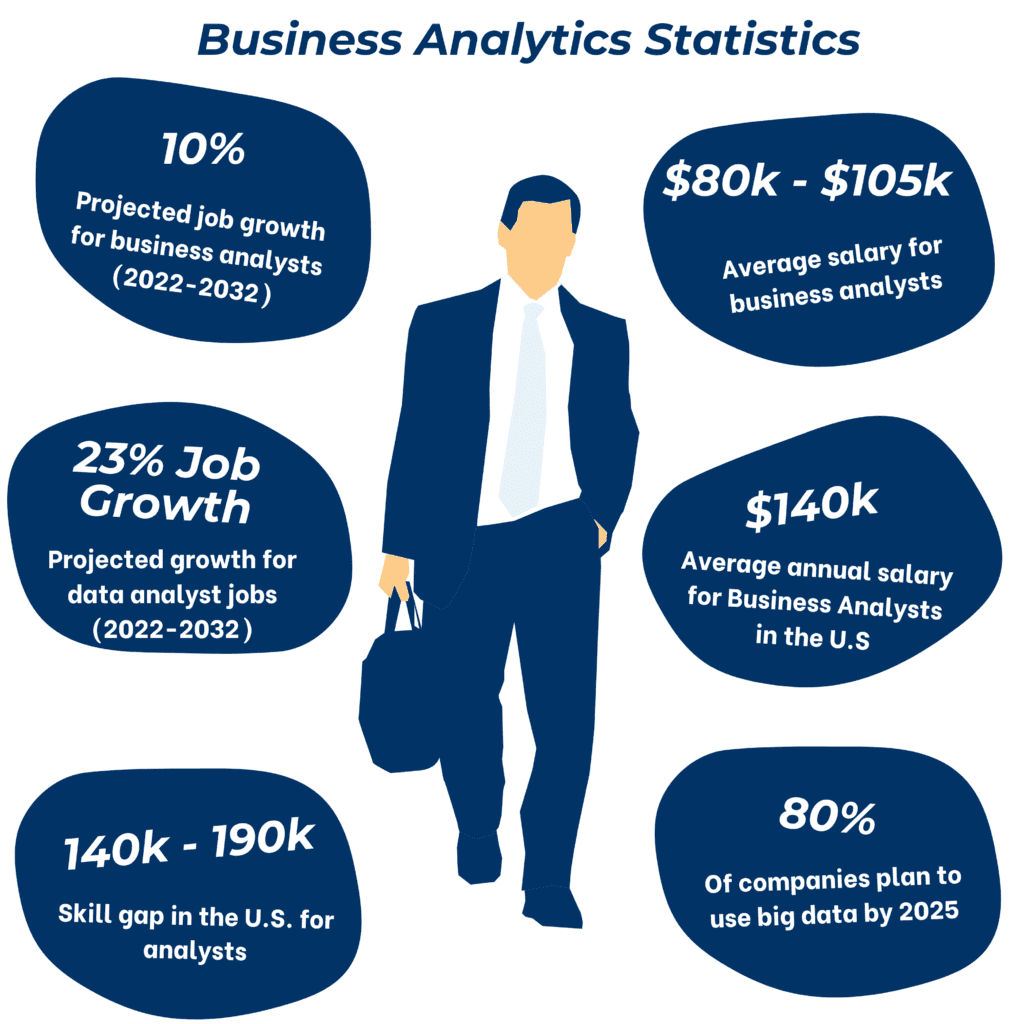What Will be the Future of Business Analytics?

Introduction
I don’t know about you, but I can’t seem to escape data. It’s everywhere. Whether it’s your streaming preferences, the websites you visit, or how your favorite brands are shaping their next product launch, data is behind it all. And if you’re someone who loves data and all the magic it can do, the next decade in business analytics is going to be huge.
By 2030, business analytics won’t just be about tracking metrics; it will be about using advanced tech like AI and real-time data to predict the future. It’ll be about making decisions before they even need to be made. Sounds like something out of a sci-fi movie, right? But this is where things are headed, and for those in the field, it’s a thrilling time to be in business analytics.
So, what does all this mean for those of us already working in analytics or those thinking of jumping in? Let’s take a look at the next decade and see how the future of business analytics will shape the industry—and your career.
What is Business Analytics?
Business analytics isn’t new, but it’s certainly evolving fast. Right now, analysts are mainly focused on helping companies understand what’s happened in the past—tracking sales, website traffic, and customer feedback. But what if we could go beyond just tracking data? What if we could predict what will happen next—and act on it in real time?
This is where the future of business analytics is headed. We’re talking predictive analytics, AI-powered insights, and tools that make analyzing data feel almost intuitive. Imagine business analysts becoming like modern-day fortune tellers—predicting trends, spotting issues before they occur, and recommending strategies that will ensure companies stay ahead of the curve.
Advanced Technologies and AI Integration
Now, when we talk about the future of business analytics, AI and machine learning are at the top of the list. These technologies will revolutionize how businesses approach data and decision-making. I mean, just think about it—no more manually combing through piles of data trying to make sense of it all. Instead, we’ll have algorithms that do the heavy lifting for us.
AI and Machine Learning in Analytics
By 2030, AI and machine learning will not just be buzzwords. They’ll be the backbone of business analytics, helping analysts to automate the repetitive stuff and focus on the big picture. These tools will be able to process massive amounts of data in real time, providing insights on everything from customer behavior to market trends.
For example, let’s say a retail company is using AI to predict what products will be most popular in the coming months. By analyzing patterns in consumer spending, social media sentiment, and even weather forecasts, AI could help the company adjust its inventory before demand spikes. And the best part? This could all happen in real time, with the AI making adjustments on the fly.
The Evolving Role of Business Analysts
Here’s the thing: As business analytics becomes more advanced, the role of business analysts is going to shift dramatically. Analysts won’t just be the people who create reports anymore; they’ll become core players in driving business strategy. Think of them less as data interpreters and more as strategic partners in decision-making.
Becoming Strategic Partners
In the next decade, business analysts will be expected to help shape the future of the company—not just explain the past. Instead of simply telling the team, “Here’s what happened last quarter,” they’ll be using predictive analytics to say, “Here’s what’s likely to happen next, and here’s what we should do about it.”
They’ll work closely with leadership to make big, bold decisions based on real-time data. For instance, a business analyst at a tech company might not only recommend a new feature for an app but also use data to predict how this change will affect user engagement in the coming months.
Citizen Developers
But it’s not just about data anymore. Business analysts will also be taking on more technical responsibilities. As low-code and no-code platforms continue to grow in popularity, analysts will become citizen developers—creating their own apps and data solutions without needing to be expert coders.
For example, let’s say a marketing team needs a new tool to track customer interactions. In the past, they might’ve had to wait for the IT department to build something from scratch. But with a no-code platform, a business analyst could quickly whip up a custom solution that fits the team’s needs and start using it right away.
Skill Set Evolution for Business Analysts

As all these changes happen, the skills required for business analysts will evolve, too. We’ll still need to be comfortable with numbers and data analysis, but the future is going to demand much more than that.
What Skills Will Be in Demand?
By 2030, business analysts will need to be proficient in a whole new set of tools. Think AI-powered analytics, cloud platforms, and even data visualization techniques that can help translate complex data into something that everyone in the room can understand.
But it’s not just about technical skills. As businesses become more data-driven, soft skills will be just as important. Analysts will need to communicate their findings clearly, collaborate with different departments, and even help lead change within the company. This means storytelling with data—taking dry numbers and turning them into compelling, actionable insights that can drive decisions.
Ethics and Data Governance
As data becomes more integral to business decisions, the role of analysts will also include managing how data is used—responsibly. Analysts will need to understand data ethics, making sure that the data is secure, accurate, and compliant with privacy regulations. And as AI plays a larger role, understanding how these systems make decisions will be essential for maintaining transparency.
Key Takeaways
- AI and Machine Learning will be central to the future of business analytics, automating tasks and providing deeper insights into business data.
- Business analysts will evolve from data interpreters to strategic partners, helping guide key business decisions and driving innovation.
- The role of analysts will require a blend of technical skills, like proficiency with AI tools and cloud platforms, and soft skills, like effective communication and change management.
- Ethical data usage and data governance will become increasingly important as companies rely more on data-driven decisions.
Work With Integrus Solutions!
As we look toward the future of business analytics, it’s clear that the landscape is changing. If you’re looking to stay ahead of the curve, now is the time to build the skills that will keep you competitive in the industry. Whether you’re an analyst looking to adapt or a business in need of top talent, Integrus Solutions is here to help.
Want to learn more about how you can grow your analytics team or find out more about how the future of business analytics will affect your business? Reach out to us today! You can contact us or call us at (713) 955-7444. We will be able to recruit business analysts to fit the needs of your business. Or, if you are interested in working with us, we are currently hiring for business analyst positions!
